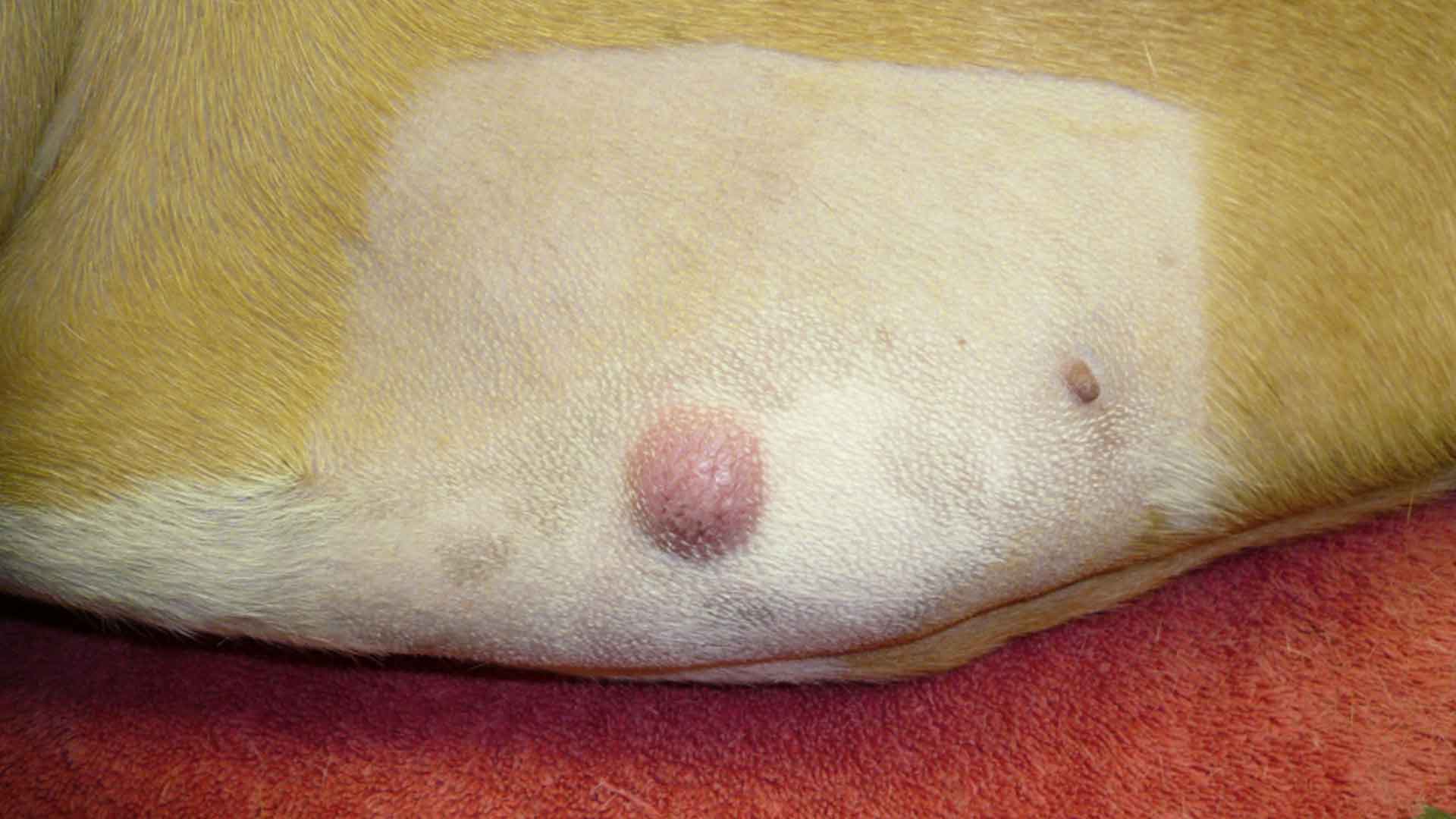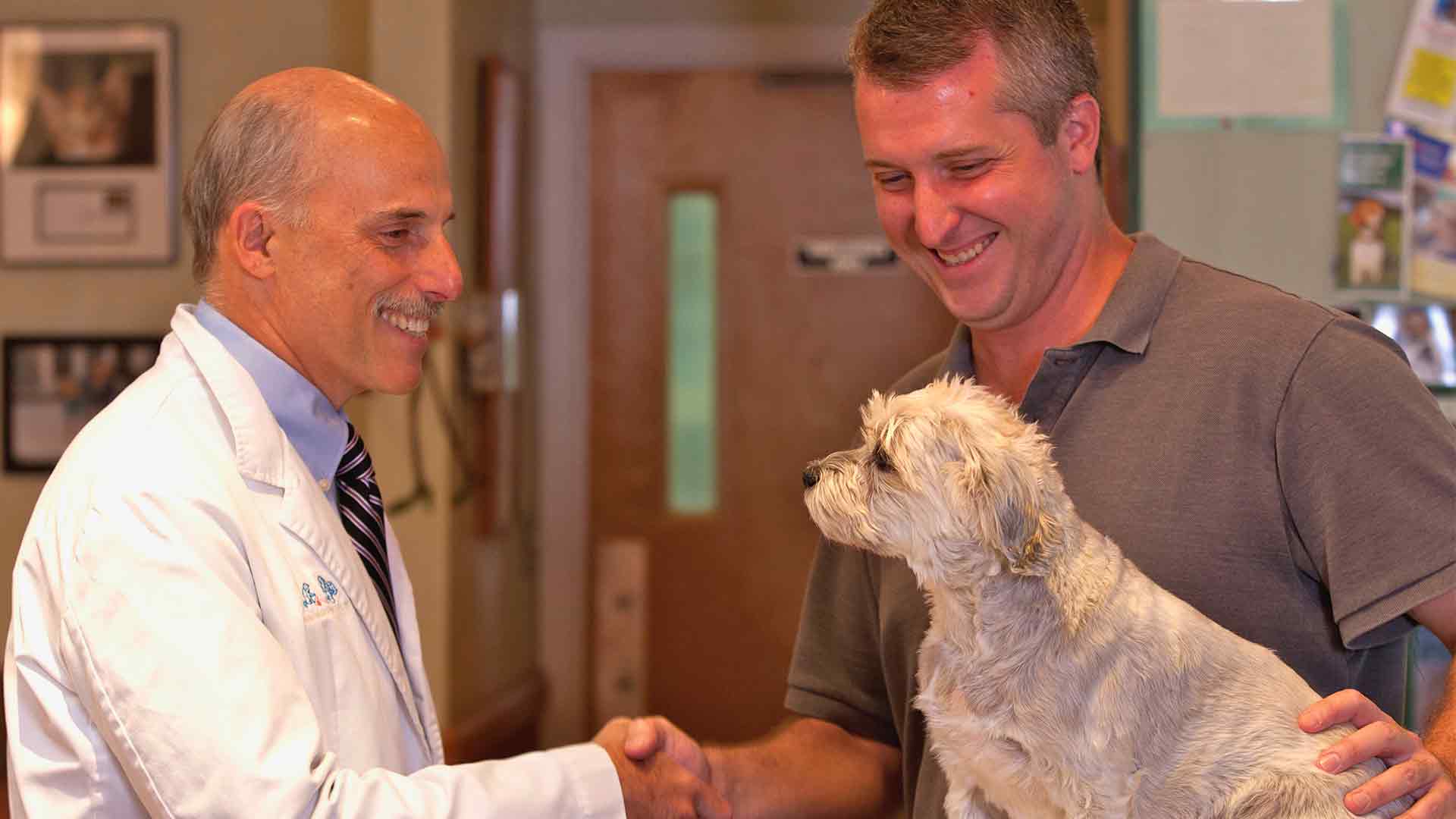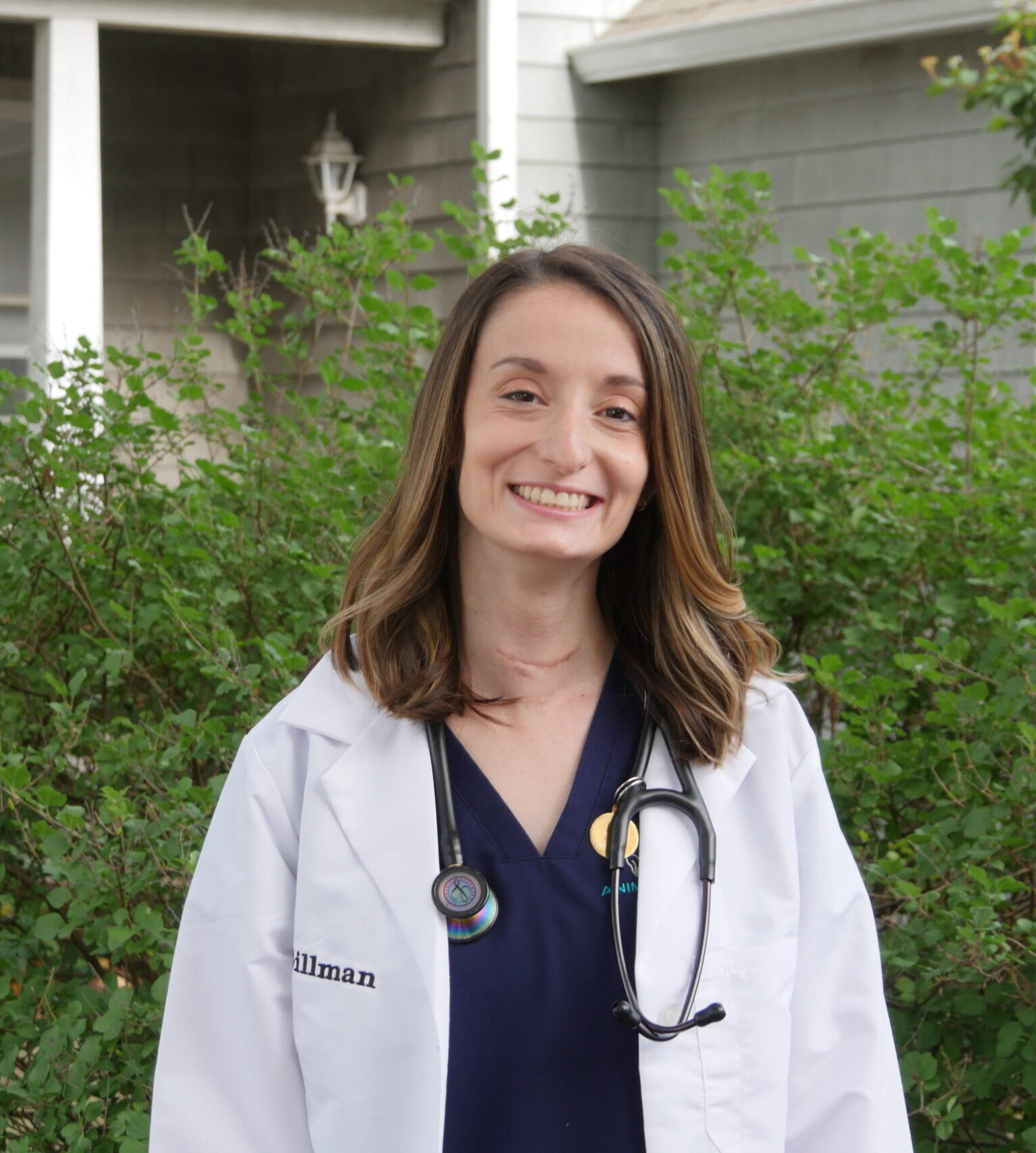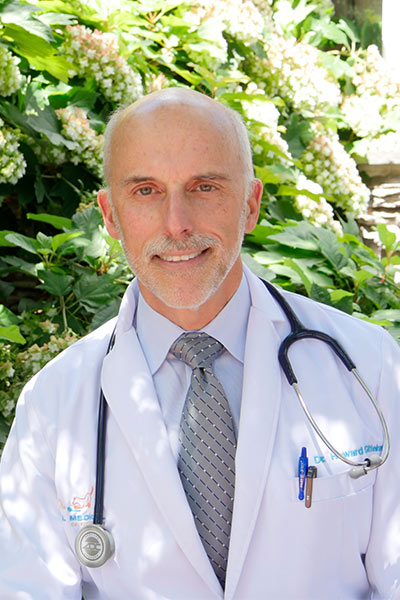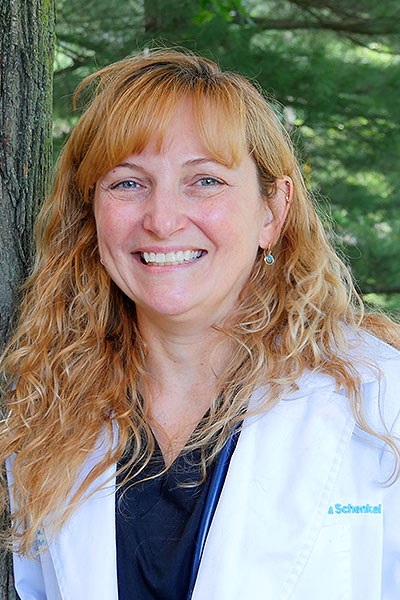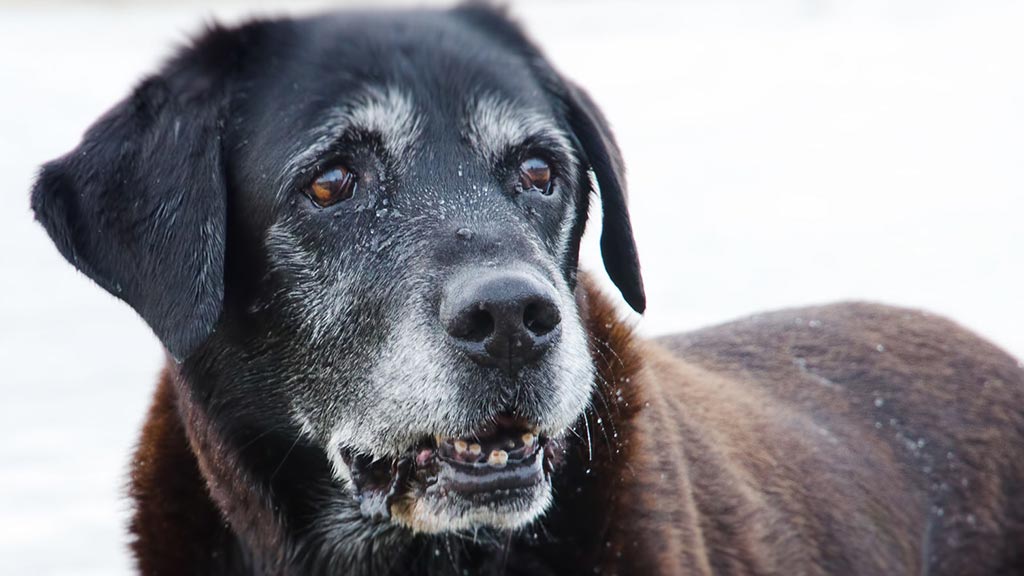
Saved a dog with arsenic? Helped remove a plastic toy from Koko the gorilla? Find out how this New City Animal Hospital became the Second Opinion Vet.
Betty White Recommended Animal Medical of New City
In 2012, Koko, the gorilla that had been taught sign language, had been suffering from nausea, a lack of appetite, and stomach pain for weeks. Doctors knew what was wrong; Koko had accidentally swallowed a piece of one of her plastic toys, but doctors were reluctant to solve the problem with surgery. They wanted to remove the toy endoscopically, but two prior attempts had failed. Koko’s health was continuing to decline and the need to find a solution was becoming urgent.
Free Phone Consultation!
Need to talk to you one of our veterinary professionals?
Animal Medical offers FREE 10 minute phone consultations and answers your pet health questions!
The Koko story is just one of many impressive medical accomplishments that the Animal Medical team has on its veterinary practice resume. As someone who works as a service coach with veterinary practices in the U.S., Canada, and the U.K., I am always on the look out for how the best in the business succeed at becoming great and staying that way. I caught up with Gittelman to ask him about his reputation as a Second Opinion Vet and what kind of an impact it has had on him and his team.
What Does It Take To Be The Second Opinion Vet?
BH: Dr. Gittelman, thank you for taking time to talk to me. What are your thoughts when you are told that many clients lean on your practice as a second opinion veterinary practice for tough medical cases or extra special care?
Dr. Gittelman: I’m proud! We are what we are today because we’ve all studied, practiced, and trained hard. I’ve been a veterinarian for 30 years and my most tenured veterinarian and leader of our Physical Medicine Department, Dr. Lisa Schenkel, has been doing it for 27. Dr. Bardari and Dr. Baker (the other two veterinarians on Gittelman’s team), Lisa and I all push one another to learn every day. Every new case means another book gets cracked, another paradigm is challenged, another phone call is made to an expert in that particular type of medicine for information and possible answers. It has been a snowball effect. Each case brings us new information and insight. Each success teaches us that passion and effort pay off.
Treating Pets With Multiple Medical Problems
BH: So, you know my dog, Rye. She’s a senior with a history of cancer, orthopedic problems, and heart issues. How does Animal Medical’s care stand out with respect to her?
Dr. Gittelman: So for a senior like, Rye, with a history of various medical problems, we have testing on site that will tell me how the major organs in her body are functioning within 20 minutes of your arrival to my practice. I have these machines because I know you’re busy and while you love Rye, it’s hard for any busy pet owner to spend half the day taking their pet the vet. Rye had several skin growths removed about 5 months ago and one turned out to be an aggressive mast cell cancer. It’s great that we spotted that early and were able to excise it with clean margins (Gittelman and his team regularly do cancer surgery for dogs and cats on site), but in these cases it’s important that we are vigilant for signs of recurrence. For this reason, we have digital radiography and ultrasound so that during any office visit, we can take a quick look at Rye’s liver, spleen and lungs and make sure that she’s still doing fine.
Arsenic Saved This Dog
Treatment for Heartworm disease is risky. Kill too many of the parasites at once and you risk overwhelming the patient’s immune system with the bodies of dead and deteriorating parasites. Don’t kill the parasites fast enough, and your risk the dog dying of cardiac failure. Add to this, the common treatment for Heartworm disease is a form of arsenic, a deadly poison if taken in high enough doses.
Advanced Dentistry For Pets
BH: Do you have other examples of services that set Animal Medical apart from more mainstream general veterinary practices?
Dr. Gittelman: We have some of the most advanced animal dentistry and oral cavity imaging equipment available and experience with virtually every kind of oral health and orthodontic issue. If the problem is digestive, then I can use the endoscope to look inside your pet’s throat, stomach, small, or large intestine. I can sample tissue or retrieve foreign bodies without major invasive surgery, thus sparing your dog or cat pain and recovery time. I can even spay a cat or dog with our endoscope and cut down on recovery time and postoperative pain.
Endoscopy and Rhinoscopy For Pets
BH: Do you do a lot of endoscopic procedures?
Dr. Gittelman: Over the years, we’ve performed dozens of endoscopic procedures. It’s an excellent tool because we can actually see the inside walls of the throat, stomach, and intestines, something that radiography or ultrasound just can’t do. We also have a smaller endoscope called a rhinoscope that allows us to visualize, and if necessary, sample tissue from, the nasal passages of pets.
Veterinary Care For Very Old Pets and Dogs With Arthritis
BH: You also have a Physical Medicine Department. That’s unique to this area, isn’t it?
Dr. Gittelman: It is.
BH: What is it?
Dr. Gittelman: Physical medicine combines western modalities of veterinary care like laser therapy, traditional diagnostics, and medicines with traditional eastern modalities like acupuncture and physical therapy. It is run by one of our most tenured veterinarians, Dr. Lisa Schenkel, who achieved an advanced degree in the modality at Colorado State after she earned her Doctorate of Veterinary Medicine. If you have an aging pet or one that is struggling with mobility issues, there is no better service for him or her than Physical Medicine, and no better doctor, I might add, than Dr. Lisa Schenkel.
BH: Clients seem to be very loyal to her.
Dr. Gittelman: They know she cares!
Employment Opportunities for Veterinary Technicians From Mercy College
BH: How did you get your team where it is today?
Dr. Gittelman: It didn’t happen overnight. We have four veterinarians at Animal Medical and we challenge one another and support each other’s learning every day. We’re always collaborating on cases, going off for more training, and sharing what we’ve learned. It’s a stimulating environment.
I also have to give credit to our fantastic nursing and support staff. One of our most senior technicians, Sandra Bertholf, is a professor and Dr. Lisa Schenkel is the Program Director at Mercy College for the Veterinary Technology Program. That gives us the chance to meet the most promising nursing students and to introduce them to our practice early on in their career. We have probably one of the highest number of registered veterinary technicians-to-doctor ratios in the county, if not the state.
Great Team Culture
BH: And it feels as though the culture of excellence feeds itself. The learning and experience that all of you bring into the practice stimulates everyone to top past accomplishments.
Dr. Gittelman: Yes, I would agree. It makes for a pretty fantastic place to work. The non-credentialed veterinary professionals, our veterinary assistants, kennel attendants and client care representatives, also deserve a high share of the praise. We doctors may be responsible for diagnosing and treating, but these heroes ensure our reputation for continual, hands-on care. And it’s not just care for the patients; it’s for the pet parents as well. We know that sick animals and vet visits in general can be a strong source of anxiety for many pet parents. We are very sensitive to how our clients feel and what they are going through and we are responsive to that.
How To Pay For Veterinary Services
BH:I know from a pet owner’s perspective, excellent veterinary care is all well and good, but what about those of us that struggle with the high prices that come with such in-depth treatment and testing?
Dr. Gittelman:The high price of veterinary care…of medicine in general…is something that all of us have to contend with and there probably isn’t a day that goes by that we aren’t evaluating the fairness of our pricing and the accessibility of our care. We are always looking for ways to help clients manage the cost of their pet’s healthcare and have a number of solutions in place to help people get the treatment that their pet needs. I personally hate when money prevents pet owners from seeking out veterinary advice. That’s why we offer free, 10-minute, veterinary phone consults with one of our veterinary professionals to everyone in our area. If you have a pet problem, but are afraid of the costs involved with treating it, call us. We’ll help you navigate a path forward.
BH: Thank you. It’s been a pleasure to talk with you.
Dr. Gittelman: Look, this is what we love to do. Thank you for giving me a forum to talk with pet owners about how we can help.
“I really need you to look at Charlie. I know you’ll figure it out.”
Advanced Dentistry For Pets
BH: Do you have other examples of services that set Animal Medical apart from more mainstream general veterinary practices?
Dr. Gittelman: We have some of the most advanced animal dentistry and oral cavity imaging equipment available and experience with virtually every kind of oral health and orthodontic issue. If the problem is digestive, then I can use the endoscope to look inside your pet’s throat, stomach, small, or large intestine. I can sample tissue or retrieve foreign bodies without major invasive surgery, thus sparing your dog or cat pain and recovery time. I can even spay a cat or dog with our endoscope and cut down on recovery time and postoperative pain.
Endoscopy and Rhinoscopy For Pets
BH: Do you do a lot of endoscopic procedures?
Dr. Gittelman: Over the years, we’ve performed dozens of endoscopic procedures. It’s an excellent tool because we can actually see the inside walls of the throat, stomach, and intestines, something that radiography or ultrasound just can’t do. We also have a smaller endoscope called a rhinoscope that allows us to visualize, and if necessary, sample tissue from, the nasal passages of pets.
Veterinary Care For Very Old Pets and Dogs With Arthritis
BH: You also have a Physical Medicine Department. That’s unique to this area, isn’t it?
Dr. Gittelman: It is.
BH: What is it?
Dr. Gittelman: Physical medicine combines western modalities of veterinary care like laser therapy, traditional diagnostics, and medicines with traditional eastern modalities like acupuncture and physical therapy. It is run by one of our most tenured veterinarians, Dr. Lisa Schenkel, who achieved an advanced degree in the modality at Colorado State after she earned her Doctorate of Veterinary Medicine. If you have an aging pet or one that is struggling with mobility issues, there is no better service for him or her than Physical Medicine, and no better doctor, I might add, than Dr. Lisa Schenkel.
BH: Clients seem to be very loyal to her.
Dr. Gittelman: They know she cares!
Employment Opportunities for Veterinary Technicians From Mercy College
BH: How did you get your team where it is today?
Dr. Gittelman: It didn’t happen overnight. We have four veterinarians at Animal Medical and we challenge one another and support each other’s learning every day. We’re always collaborating on cases, going off for more training, and sharing what we’ve learned. It’s a stimulating environment.
I also have to give credit to our fantastic nursing and support staff. One of our most senior technicians, Sandra Bertholf, is a professor and Dr. Lisa Schenkel is the Program Director at Mercy College for the Veterinary Technology Program. That gives us the chance to meet the most promising nursing students and to introduce them to our practice early on in their career. We have probably one of the highest number of registered veterinary technicians-to-doctor ratios in the county, if not the state.
Great Team Culture
BH: And it feels as though the culture of excellence feeds itself. The learning and experience that all of you bring into the practice stimulates everyone to top past accomplishments.
Dr. Gittelman: Yes, I would agree. It makes for a pretty fantastic place to work. The non-credentialed veterinary professionals, our veterinary assistants, kennel attendants and client care representatives, also deserve a high share of the praise. We doctors may be responsible for diagnosing and treating, but these heroes ensure our reputation for continual, hands-on care. And it’s not just care for the patients; it’s for the pet parents as well. We know that sick animals and vet visits in general can be a strong source of anxiety for many pet parents. We are very sensitive to how our clients feel and what they are going through and we are responsive to that.
How To Pay For Veterinary Services
BH:I know from a pet owner’s perspective, excellent veterinary care is all well and good, but what about those of us that struggle with the high prices that come with such in-depth treatment and testing?
Dr. Gittelman:The high price of veterinary care…of medicine in general…is something that all of us have to contend with and there probably isn’t a day that goes by that we aren’t evaluating the fairness of our pricing and the accessibility of our care. We are always looking for ways to help clients manage the cost of their pet’s healthcare and have a number of solutions in place to help people get the treatment that their pet needs. I personally hate when money prevents pet owners from seeking out veterinary advice. That’s why we offer free, 10-minute, veterinary phone consults with one of our veterinary professionals to everyone in our area. If you have a pet problem, but are afraid of the costs involved with treating it, call us. We’ll help you navigate a path forward.
BH: Thank you. It’s been a pleasure to talk with you.
Dr. Gittelman: Look, this is what we love to do. Thank you for giving me a forum to talk with pet owners about how we can help.

